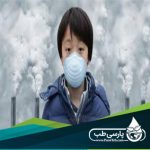Air pollution: air quality significantly affects people’s lives. It’s clear that life in a non-polluting environment has a higher quality, but do we really know how air pollution affects our health and which parts of our body are damaged by any contaminated particles?
 Around the world, annual air pollution causes about seven million deaths. The growth and concentration of the population in cities, as well as the way energy is used in urban areas through transportation, heating and ventilation, makes the huge amounts of gases that are harmful to health released to the atmosphere.
Around the world, annual air pollution causes about seven million deaths. The growth and concentration of the population in cities, as well as the way energy is used in urban areas through transportation, heating and ventilation, makes the huge amounts of gases that are harmful to health released to the atmosphere.
The main causes of air pollution
The emission of various gases from transport, burning fossil fuels, industrial production, forest fires, the use of aerosols are some of the main causes of air pollution.
 Many of these gases released into the atmosphere from human activities are very toxic to humans.
Many of these gases released into the atmosphere from human activities are very toxic to humans.
The most dangerous gases are: Ozone (O3), Sulfur dioxide (SO2), Nitrogen dioxide (NO2), Benzo (a) pyrine (BaP) and suspended particles (PM).
How does air pollution affect our health?
Air pollution has effect on our physical and mental health. The function of many organs is damaged by air pollution.
The consequences of air pollution on human health include:
Respiratory diseases
Cardiovascular diseases
Fatigue, headache and anxiety
Irritation of the eyes, nose and throat
Damage to reproductive organs
Damage to the liver, spleen, and blood
Nervous system’s diseases
Urban populations are more exposed to air pollution and their effects are more pronounced on those who are more sensitive. Including: children, pregnant women and the elderly.
How to deal with it?
BreatheLife’s Innovative Initiative was developed by the World Health Organization (WHO) and the Clean Air Association (CCAC), the United Nations Environment Program (UNEP) and 54 other countries, to reduce air pollution.
 The goal of the plan is “to mobilize cities and individuals to protect the health of the planet from air pollution,” and its main objective is to reduce the deaths from air pollution 50 percent by 2030.
The goal of the plan is “to mobilize cities and individuals to protect the health of the planet from air pollution,” and its main objective is to reduce the deaths from air pollution 50 percent by 2030.
The ways to join this international project are to develop and support local policies focused on improving transportation, waste management, improving air quality, providing human energy with new energies including solar energy. In general, it will improve energy consumption in the urban, industrial and agricultural sectors.
So it’s better not to be late today thinking about our health and future generations! Tomorrow is too late…
 Parsi Teb Physical and Mental Health Journal
Parsi Teb Physical and Mental Health Journal 



